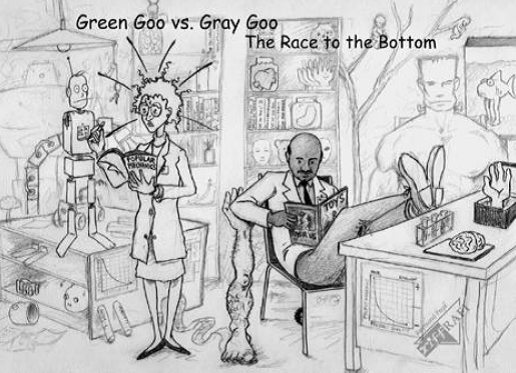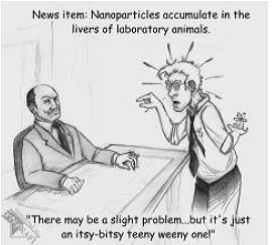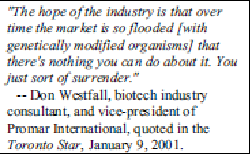The first and greatest impact of nano-scale technologies may come with the merger of nanotech and biotech - a newly recognized discipline called nanobiotechnology. While Gray Goo has grabbed the headlines, self-replicating nanobots are not yet possible. The more likely future scenario is that the merger of living and non-living matter will result in hybrid organisms and products that end up behaving in unpredictable and uncontrollable ways - get ready for "Green Goo!"
Briefings

The Year of Playing Dangerously
Thirteen months ago, the agbiotech industry wakened to a nightmare. Illegal and unwelcome, the presence of genetically-modified (GM) maize was reported smack in the crop's center of genetic origin in Mexico. There's never a good time for a political/ecological calamity, but the beleaguered Gene Giants were already struggling to persuade consumers, following the Taco Debacle (Starlink), that companies could control their inventions and their inventory. The seed companies were also hoping to arm-twist EU ministers into lifting the ban on GM products in Europe.
Extract of Andean Root Crop Patented for “Natural Viagra” Properties
Indigenous peoples' and farmers' organizations from the Andes and the Amazon gathered at the offices of the Ecological Forum in Lima, Peru on 28 June 2002 to formally denounce US patents on maca, the high-altitude Andean plant (of the Cruciferae [mustard] family) that has been grown for centuries by indigenous peoples in the Puna highlands of Peru, both as a staple food crop and for medicinal purposes. Today, maca-based products are commonly promoted as natural enhancers of sexual function and fertility, and demand for maca is growing in the US, Europe and Japan.
Update (June 2002)
According to the International Service for the Acquisition of Agri-Biotech Applications (ISAAA) the global area devoted to transgenic or genetically modified (GM) crops has increased more than 30-fold from 1.7 million hectares in 1996 to 52.6 million hectares in 2001. The statistics show an extraordinarily rapid market introduction. More astonishing is the concentration in ownership and control of GM crop technology. At this point in time, GM crop technology is dominated almost exclusively by a single company, in limited geographical areas.

Nanotech Particles Penetrate Living Cells and Accumulate in Animal Organs
Are nanoparticles polluting the environment? Researchers have just begun to ask the most basic questions about the impact of new nano-materials on human health and the environment. Evidence of nanoparticle contamination in living organisms and unanswered questions about potential dangers of new forms of carbon require urgent societal review.
...to promote genetic seed sterilization - Terminator technology - as an environmental protection technology
It is revisionist history, and a cynical strategy, to suggest that Terminator was developed as a biosafety tool.
ETC Group is alarmed and insulted by the campaign to promote Terminator as a biosafety mechanism. It is unacceptable and dangerous to suggest that agriculture is dependent on genetic seed sterilization as a method for minimizing genetic pollution from genetically modified plants.

+ Captain Hook Awards 2002
On the 10th anniversary of the Convention on Biological Diversity (CBD), ETC group concludes that the CBD has failed to establish meaningful regulations to stop biopiracy. Biopiracy refers to the appropriation of the knowledge and genetic resources of farming and indigenous communities by individuals or institutions seeking exclusive monopoly control (usually patents or plant breeders' rights) over these resources and knowledge.

Genetic Pollution in Mexico's Centre of Maize Diversity
ETC group explores the fractious scientific and political debate surrounding GM maize contamination in Mexico.

Alternative Mechanisms to Enhance Corporate Monopoly and BioSerfdom in the 21st Century
This Communique identifies new mechanisms - ranging from remote sensing technologies, biological monopolies, and legal contracts - that are being developed by a broad range of industries to strengthen corporate dominance over new technologies. The political, practical and technical uncertainties surrounding intellectual property are increasingly unacceptable to industry - and that is why companies are developing new tools for monopoly control- what ETC group calls "New Enclosures."
On the Centenary of a Famine
In a period framed by the World Food Summit of 1996 and the Summit's rescheduled review in 2002, ETC Group looks back at the same span of years one century earlier as history lesson and as portent. These years (1896-1902) marked an era of devastating global famine when no less than 30 million people died in circumstances strikingly similar to those we face today-trade liberalization (i.e., "globalization"), climatic change, (corporate) colonialism, and a set of new technologies promising, once again, to feed the hungry.
